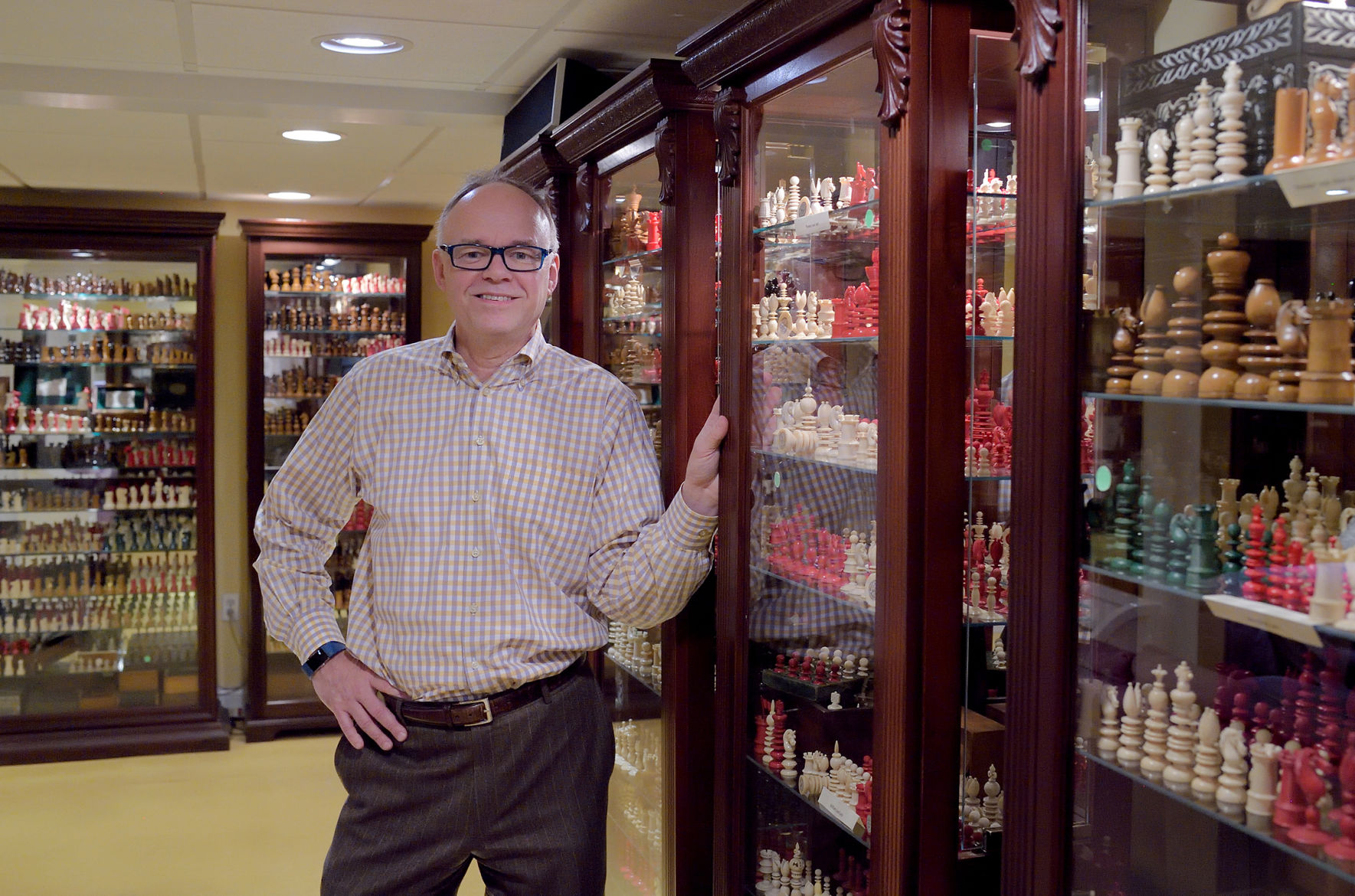By Philip Sean Curran
Chess fills Jon Crumiller’s thoughts, from the intricate moves on the chessboard he makes each day to the even more intricate chess sets that he has collected in the past 13 years.
He is regarded as one of the top collectors anywhere, a distinction that readers will discover in the new coffee table book he co-wrote, “Masterworks: Rare and Beautiful Chess Sets of the World.” More than half the pieces from around the world that are featured in the book are his.
Filled with page after page of photographs, the book shows chess pieces not simply as things to play with but as small works of art — detailed in their design, varied in their shape.
Seated at the dining room table inside his home in an upscale Princeton neighborhood, Mr. Crumiller recently discussed how he was introduced to the sport that is an “ingrained” part of him, the two times he competed against the world’s best player and why he got into collecting.
Perhaps like the chess player he is, Mr. Crumiller is careful, deliberate even, in his words. Nearing 60, he is balding and not physically imposing, yet inside is a fierce competitiveness that chess provides an outlet for to beat his opponent.
Mr. Crumiller, who turns 58 later this month, is originally from a suburb outside of Wilmington, Delaware. His late father, Robert Miller, taught him the game.
”Well, my dad played,” he said. “I’m not sure I would quite call him a chess player.”
Mr. Crumiller has been playing since the time he was around 8 years old, drawn, in part, to a game with “logic to it and also the competitive aspect.”
”I’ve always been competitive,” he said, “and fortunately not to an extreme or at least in my adulthood, I’ve been able to not have that to an extreme.”
He plays chess daily over the internet, an opportunity to compete against the best players from around the world. He can be up as early as 3 a.m. trading moves with an opponent in Russia or Australia.
”It’s not an obsession,” he said, “but it could be.”
”Chess is obsessive,” he continued, “because it is so stimulating. It’s so intellectually stimulating and not just intellectually stimulating, it’s emotionally stimulating because your persona is part of the game too.”
He said he prefers playing people rather than against a computer, even though the machines are better players.
At one point, he waxed philosophical about a sport he said is an outlet for him. “It’s an outlet for creativity. Chess is a really creative game,” said Mr. Crumiller, a US Chess Federation recognized national master. “Of course like anything else, there are ground rules to it. But at the same time within those ground rules, is a whole spectrum of latitude.”
Mr. Crumiller has competed twice against Magnus Carlsen of Norway, the 26-year-old who just won the World Chess Championship in New York. He has yet to beat him.
”He’s the strongest player,” Mr. Crumiller said. “He sees more of what I’m doing than I see of what he’s doing.”
Mr. Crumiller studied computer science at the University of Delaware, and later co-founded Princeton Consultants, a consulting company. He lives in the Library Place section of Princeton along with his wife, Jenny; the couple — who blended their last names, his is Miller and hers is Crum — have three adult children and two grandchildren. Both husband and wife are active in Democratic politics, with Ms. Crumiller a councilwoman.
As for his chess collecting, he started in 2003 and built a reputation for himself in that short time. He said he never made a conscious decision to be a collector, per se.
”I always thought collectors had a little screw loose somewhere,” he said, “yet here I am.”
But when he finds something of a sublime beauty or historical importance, he said he finds himself wanting to acquire it.
Thirteen years ago, he was on eBay when he came across an antique 1870s Jaques chess set, the “Rolls Royce” of sets, he said. He bought that one, and then he saw another one a few days later, and bought that one too. He evolved from collecting playing sets to ornamental sets, to a total of 620 sets, and is a collector of all things chess, including chess books going back to the 1400s.
”I would say it’s one of the great chess set and chess boards and chess tables and chess memorabilia collections in the country,” said Frank Brady, president emeritus of the Marshall Chess Club in New York.
That Mr. Crumiller is a very good chess player also sets him apart from other collectors, Mr. Brady said.
”Usually, for some reason, many of the chess collectors are not” (very good players), Mr. Brady said. “They’re art lovers. They like chess and they know how to play chess. But they’re not really terrific players. But Jon is a very good player as well as being a collector.”
”Partly because it’s the same mindset as chess itself,” Mr. Crumiller said of his collecting. “When you tackle something, you tackle it a 100 percent.”
Today, he writes a monthly column on antique chess collecting for World Chess. Though this was his first book, he said he has a novel coming and, perhaps surprisingly, it has nothing to do with chess.

